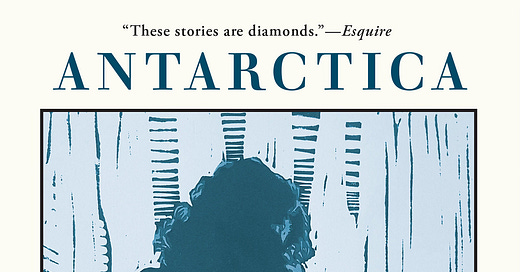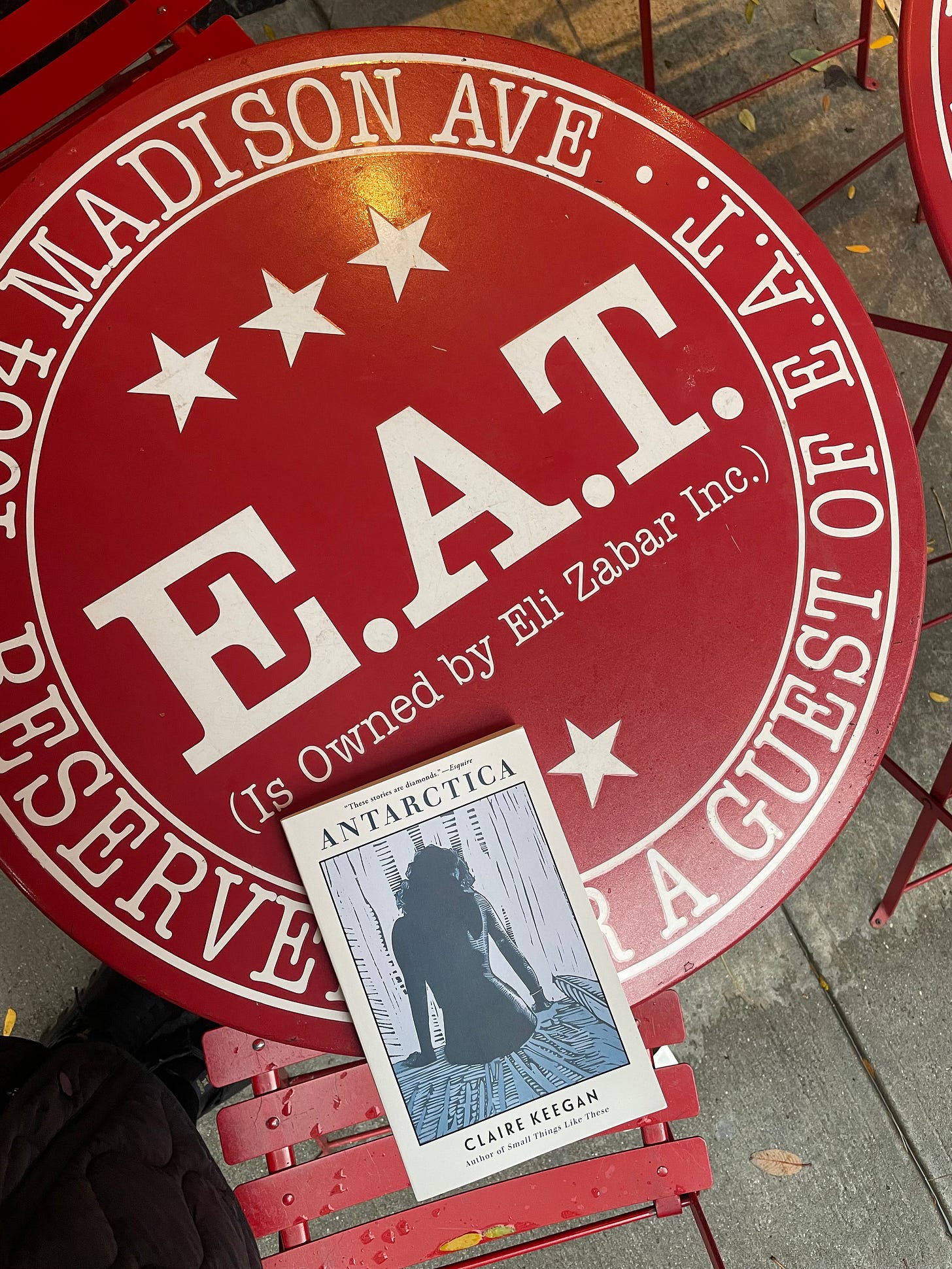Keegan, Always Keegan
I wake in the dead of night, consumed by an irresistible urge to read more Claire Keegan.
“Every time the happily married woman went away, she wondered how it would feel to sleep with another man. That weekend she was determined to find out. It was December; she felt a curtain closing on another stage. She wanted to do this before she got too old. She was sure she would be disappointed.”
— Keegan, “Antarctica.”
I picked up my copy of Antarctica at The Strand on Columbus Avenue. During my lunch break at E.A.T., a sweet, classy gentleman shyly approached me and said, "I can't help but notice your Keegan over there," nodding toward Antarctica on the table. I was floored—no one ever notices my Keegans, and, quite frankly, I find that deeply offensive.
Flustered, I almost yelped. I just stared at him (he was with his wife and friends), and he continued, "She really is incredible." Gathering myself, I replied, "Sir, thank you for noticing. She is a very special writer—the best of our time, if you ask me."
He then asked, "Which one do you have there?" I showed him my copy, and we chatted about her work, particularly So Late in the Day (Stories of Women and Men). He said he’d make sure to pick up a copy of Antarctica.
I live for these serendipitous book encounters with strangers.
What I admire most about Keegan is her ability to prove that brevity is the soul of both relevance and brilliance. Her short stories unsettle not through overt shock value but with their quiet, understated power. They are profoundly important, deeply unsettling, and often shocking—all in equal measure.
Antarctica, published in 1999 as Keegan’s debut collection, announced her arrival as a master of the short story form. I discovered this collection after reading her latest work, So Late in the Day (Stories of Women and Men), which compelled me to explore her earlier writings. Naturally, her acclaimed works Foster and Small Things Like These are also essential reads. By "finishing" Keegan’s books with her first publication, I had the unique experience of tracing her evolution as a writer in reverse—a journey that only deepened my appreciation for her craft.
I don’t ask much of you, dear reader, but do yourself a favor: read these stories. You can thank me later.
Claire Keegan’s Antarctica: Mastery in Miniature
Claire Keegan achieves in a few quiet pages what many authors labor to accomplish over the course of an entire novel. Her prose is a masterful layering of heartfelt investigations, imbued with subtle nuance and dialogue so vivid it feels overheard rather than read.
In Antarctica, her stories explore themes of infidelity, death, sexuality, and grief, centering on flawed yet compelling characters who grapple with the crushing weight of patriarchy. Though brief, these tales possess a richness and depth that make them feel expansive, leaving readers convinced they extend far beyond their modest word count.
Like a spider spinning an inviting web, Keegan lures readers in with soft, unassuming prose. Yet, by the time you realize you’re ensnared, it’s too late to dodge the emotional blows that land with devastating precision.
The Title Story: Antarctica and Gendered Risks of Freedom
This mastery is particularly evident in the title story, Antarctica, which follows a woman traveling to the city with the intention of engaging in a brief affair with a stranger. A sense of unease lingers throughout, but it’s not until the story’s conclusion that the full weight of its impact hits. The ending arrives with sudden ferocity, leaving you gasping for breath. It’s a gut-wrenching, unforgettable moment that stays with you long after the final line—a rarity in fiction and a testament to Keegan’s storytelling prowess.
More than a shocking tale, Antarctica vividly explores the unique challenges women face in navigating their desires and freedoms. Unlike men, women’s pursuit of joy, adventure, or connection is often overshadowed by profound risks—threats to both their physical safety and mental well-being. These pervasive dangers impose a vigilance that dims even the briefest moments of liberation, stripping them of their lightness. In a society where carefree existence remains a luxury reserved for men, women are forced to navigate life in a perpetual state of preparedness—armed with both literal and metaphorical "pepper sprays," resilience, and a sobering awareness of lurking threats. Keegan captures this tension with unflinching clarity, showing how the ever-present potential for harm casts a long shadow over what might otherwise feel freeing.
Patriarchy’s Impact on Men and Women
Keegan’s stories move with the precision of a sleight-of-hand trick, leaving readers marveling at their craft only to discover they’ve been caught in an emotional trap all along.
In Sisters, for instance, the relationship between a dutiful sister and her indulgent counterpart culminates in a surprising yet deeply satisfying resolution. Meanwhile, The Singing Cashier tackles the predatory behavior of men toward vulnerable women, ending with the chilling realization that the protagonists live in the shadow of the real-life horrors of Fred West, a notorious murderer of young girls.
Throughout the collection, Keegan examines the ways patriarchal values entrap women, while also acknowledging their collateral damage on men. In Quare Name for a Boy—one of the collection’s standout stories—a pregnant young woman decides to raise her child alone, rejecting the man from her one-night stand. Her powerful resolve is encapsulated in the line: “I will not be the woman who shelters her man same as he’s a boy. That part of my people ends with me.”
Similarly, Men and Women portrays a mother and daughter subjected to the father’s oppressive moods. Their quiet resistance ultimately leads to a reckoning, offering a moment of catharsis. In Passport Soup, Keegan shows how patriarchy’s expectations harm men, illustrating how a grieving father’s sorrow over his child’s death is compounded by his perceived failure to meet societal standards as a man and provider.
Keegan’s nuanced portrayal of patriarchy transcends simplistic binaries, offering a deeply empathetic exploration of its pervasive harms.
Sexuality, Infidelity, and Unforgettable Voices
Sexuality and infidelity thread through these tales, culminating in The Ginger Rogers Sermon. This final story is an extraordinary exploration of a young girl’s awakening sexuality, set against the backdrop of her father’s lumberjack business and her attraction to a charismatic, larger-than-life figure named Slapper Jim. The story’s voice is spellbinding, and its shocking conclusion lingers long after the last word.
Lastly, while Keegan’s Irish-set tales resonate with the authenticity of local phrasing, many of her stories are unexpectedly rooted in the southern United States—a revelation that took me by surprise while reading this collection. In Ride if You Dare, for example, Keegan masterfully captures the cadence and culture of the South, likely drawing on her time at Loyola University in New Orleans, Louisiana—a detail I only recently learned. This impressive versatility showcases her extraordinary ability to bring vastly different worlds to life with equal depth and precision.
I leave you with a handful of sparkling gems from Keegan to brighten your day:
“It’s always married people who cry at weddings. They know the difference between the vows and the life.” — Keegan, “Love in the Tall Grass.”
“That’s the way it is in our house, everybody knowing things but pretending they don’t.”
— Keegan, “The Ginger Rogers Sermon.”
“It’s turning out that I’m taking no nonsense from anybody.’’ — Keegan, “Storms.”





